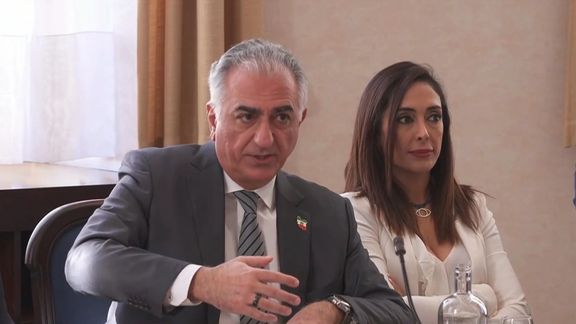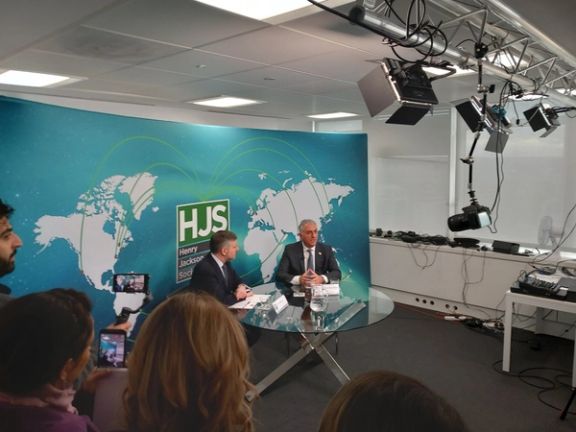Exiled Prince Touring Europe To Garner Support For Iranian Protests

Exiled Prince Reza Pahlavi, who has been very active in recent days touring Europe and advocating the “revolution in Iran,” is in Belgium for a European parliament event.

Exiled Prince Reza Pahlavi, who has been very active in recent days touring Europe and advocating the “revolution in Iran,” is in Belgium for a European parliament event.
He arrived in the Belgian capital Brussels on Tuesday and was welcomed by the Swedish Member of the European Parliament Charlie Weimers, one of his hosts in a Wednesday event, titled “A secular, democratic Iran: implications for Europe's economy and security.”
The former Crown Prince held meetings with Belgian lawmakers from different parties at the country’s parliament later in the day.
According to Iran International’s correspondent in Brussels, Bardia Afshin, Pahlavi was asked to talk about his cooperation with other prominent dissident figures and his negotiations with diplomats and officials of other countries meant to garner support for the current protests in Iran, which have been going on for over six months and have been described as the boldest challenge the Islamic regime has faced so far.
During the event at the Belgian parliament, Pahlavi said that the global society should feel comfortable with the alternative to the Islamic Republic, noting that the sooner the transition happens, the sooner the sanctions can be removed and Iran can have foreign investment. He also briefed the lawmakers of the opposition’s ideas for the interim government, which will have specialized committees for different tasks that should be performed during the transition period until a referendum is held in the country.
Pahlavi spoke about the charter of solidarity and freedom of Iran, reiterating that it creates the basis of cooperation among opposition forces to oust the Islamic Republic. "Iran's Charter of Solidarity and Freedom", which is being finalized, includes the minimum principles of agreement for the majority of secular democratic forces. The exiled prince also said that the content of the charter is coordinated with the activists and protesters inside the country to reflect their views and visions for the future of Iran. He said the charter is composed of voices coming from inside the country.
Pahlavi also mentioned jailed lawyer and activist Nasrin Sotoudeh and civil and human rights activist Narges Mohammadi, as well as Fatemeh Sepehri, another activist opposed to the Islamic Republic, as being among the people whose ideas were considered in the charter.
In their historic joint event in Washington on February 10, eight prominent opposition figures held a joint forum, signaling the emergence of a leadership council in the diaspora to campaign for international support in favor of Iran’s protest movement. They also called for support from democratic countries to change the regime in Iran and establish democracy.
On Wednesday, Weimers and Czech MEP Tomáš Zdechovský will host Pahlavi at the European Parliament for the first time where he is scheduled to deliver a keynote speech. His visit to Belgium is the latest leg of his European tour packed with meetings aimed at strengthening support for the newly formed Iranian democratic opposition in EU institutions and pushing for sanctions against the Revolutionary Guards – the IRGC.
Earlier in the month, more than 20,000 Iranians held a protest rally outside the European Council in the Belgian capital, to call on the European Union countries to designate the IRGC as a terrorist organization. Thousands of Iranians from all over Europe held a massive rally in Strasbourg in January to pressure the European countries to list the IRGC.

Before Brussels, he was in London, where he attended events at the Oxford Union and the Henry Jackson Society as well as the House of Commons. Hundreds of Iranians had come from across the UK packing the streets of Oxford on Monday, February 27, to catch a glimpse of the son of Mohammed Reza Pahlavi, the last Shah of Iran. Amid a low police presence, there was a carnival-like atmosphere, with people holding red roses as a sign of respect for the prince. His supporters hope one day he will be the King in a constitutional monarchy.
Before the Iranian Revolution in 1979, he was the heir apparent to Iran’s 2,500-year-old throne, but he has repeatedly announced that he is not seeking the throne and people should vote if they want a Republic or a monarchy.